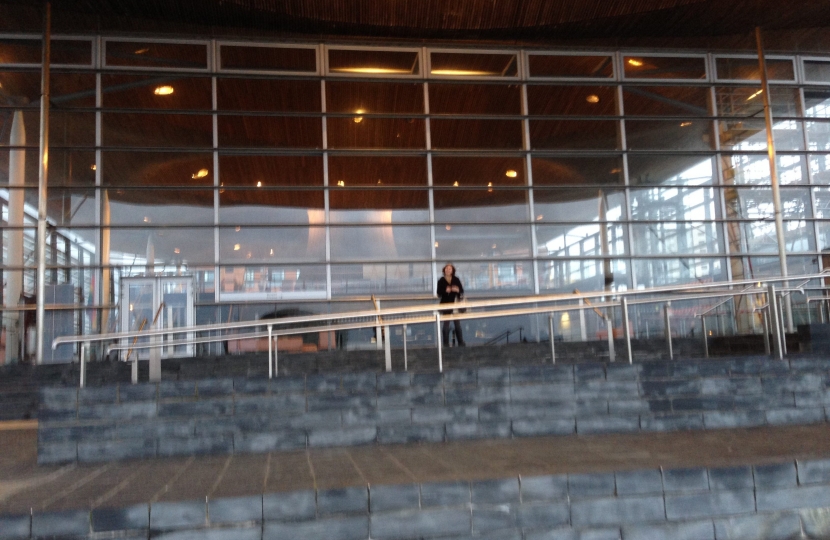
Calls on the Welsh Government to work with local authorities to encourage family-friendly working environments, and to take into account the report’s findings regarding childcare availability, timings of meetings and the atmosphere of council meetings.
Janet Finch-Saunders;Deputy Presiding Officer, having spent many happy years in local government at town and county level, holding the positions of the mayor of Llandudno, Conwy county borough councillor, cabinet member in Conwy, the Welsh Conservative group leader of 22 and chairman of the principal scrutiny committee, I must confess to, at times in the early days in particular, feeling to be one of a rare breed. In fact, it has to be said that I think that some of my friends thought that I was odd. I had a daughter of four and suddenly, I was going out of an evening to meetings, when you could argue that many people in those days thought, ‘No; you should be at home’. I remember vividly telling my husband that I would probably only be out two nights a month. In fact, I should have said that I would probably only be in one night a month.However, I have to say that things are changing. Whereas people thought it odd in those days, now, I find that people ask me, ‘How did you get into politics?’ and ‘How would I do that?’ and I support them and help them to follow the sort of career that I have—not so much a career, but a vocation, with a love of what I do.
Despite previous workshops and reports, it has to be acknowledged that we still have much to do to ensure that all five levels of elected democracy and governance across Wales encompass a balance that is far more representative of those we aim to serve and on whose behalf we often speak, in our community councils, but also in our local authorities. I have been eagerly awaiting this particular report and agree in paying tribute to the group and the chair, Professor Laura McAllister, for their hard work.
In the foreword, Laura mentions that far too many councillors are elected without contest. This is a really sad fact—Blaenau Gwent at 86%, with 59 seats uncontested; Conwy at 282 seats, 71%, and Powys at 87%, with 904 seats uncontested. So, clearly, we are getting something wrong; that should not be the case. Anyone who has been in politics in local government will tell you that the co-option process does leave rather much to be desired. Quite often, it is middle-aged men who decide that they want their chums to be co-opted. I am a great believer that we should be going forward with elections. As regards transparency, the elected process does bring more awareness and opportunity for community-minded individuals to step forward and become fully elected, valued members of our communities.
Moving on, the introduction by the Minister for Local Government and Government Business refers to a motion that was passed in May 2013 about the necessity of advocating efficient, open, transparent and accountable local democracy and scrutiny, which certainly resonates with me. However, we have seen shocking examples of some authorities refusing to allow light to be shone on proceedings. There is no greater example than when Jacqui Thompson—a community-minded female—found herself arrested for using a mobile camera in the public gallery. Only last week, we saw mention of Pennard Community Council in Swansea electing to change its standing orders to prohibit tweeting during a council meeting. This is archaic and is a draconian approach. This, combined with a series of issues around transparency in Carmarthenshire, Caerphilly and Pembrokeshire, does nothing to encourage people, let alone people of a more diverse background, to come forward.
The local government Measure 2011, while seeking to implement many of the 35 recommendations of the councillor commission expert panel in Wales, has started to put in some good mechanisms, but we are not there. For us to move forward, it is not about the number of recommendations that are in the report, but more about which of those are a determined and pragmatic way forward to implement absolute change. I acknowledge that the Measure introduces a requirement on principal councils to conduct surveys, and send in data for analysis to the Welsh Government, but I would like to see more disabled people coming forward, for instance. The UK Government has a fund in place to offer individual grants to support this and I believe that that fund is only until about May this year. I would ask the Minister what considerations and evaluations she has taken with regard to having a similar scheme here in Wales.
Why are we not pushing for elections to see our young members engaged with a more democratic approach, thereby raising the awareness and the importance of serving one’s community? I think that the media have a lot to do with that. I note the reference to senior members of Plaid Cymru engaging directly.
I really do endorse this report. However, as with many of the reports that come before us, the proof of the pudding will be in the eating. Let us hope that, in another five years, we are not still having the debate about how we can attract more diversity into our local government.
